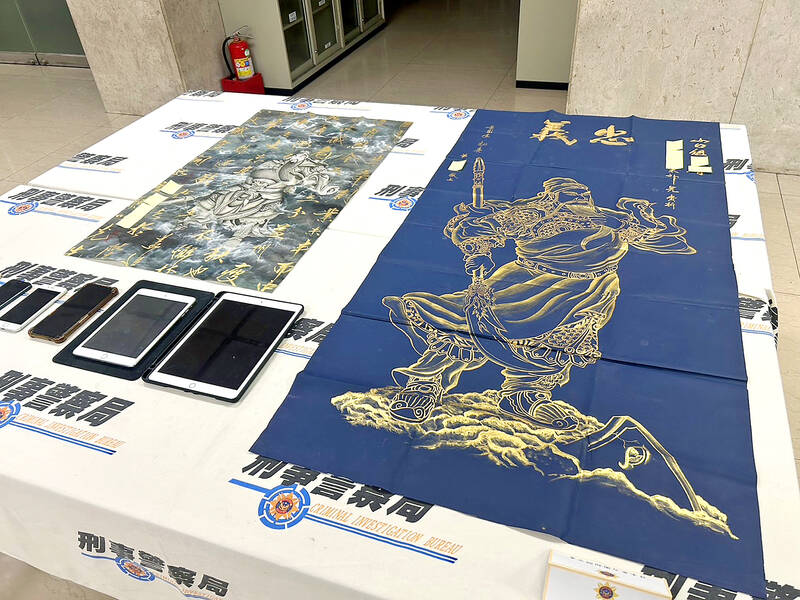Cooperation between Taiwanese and Japanese police has shut down a chemical factory in Japan allegedly producing amphetamine and led to the arrest of 10 people, including suspected members of Japanese organized crime groups.
The main figure in the case is Tsang Tien-pao (臧天寶), 61, who has Japanese-Taiwanese parentage, and is allegedly a member of the Inagawa-kai, the third-largest yakuza group in Japan, the Criminal Investigation Bureau (CIB) said on Thursday last week.
Born in Kanagawa, Tsang joined the Inagawa-kai during his youth, the CIB added.

Photo: Chiu Chun-fu, Taipei Times
Background checks showed that Tsang spent four years in prison for running over and killing a pedestrian in 1998, and lost his Japanese residency. After his release, Tsang has mainly lived in Taiwan.
Tsang reportedly led the collaboration between Japanese and Taiwanese gangs, and he allegedly sent two chemists to Japan, surnamed Wu (吳) and Chen (陳), who have experience in manufacturing narcotics, to produce amphetamines, CIB investigators said.
Last year, Tsang linked up with a person surnamed Yamanouchi, who was a member of the Sumiyoshi-kai, Japan’s second-largest criminal gang, the investigators said.
Tsang and Yamanouchi allegedly led the Taiwanese chemists to set up a small factory in mountains near Matsuyama on Shikoku Island. They produced 2kg of amphetamine, and sold it via underground channels, with the proceeds split with the Sumiyoshi-kai, investigators said.
After receiving tip-offs, the CIB put Tsang and others under surveillance. As Wu took a trip to Shikoku in May, the bureau’s international division notified Japanese authorities.
A raid was carried out and 103g of amphetamines was seized, along with 60kg of ingredients, and Japanese authorities arrested Wu, Yamanouchi and their alleged accomplices. The CIB apprehended Tsang and Chen in June, and found material, including communications records at Tsang’s residence, the investigators said.
Japanese authorities conducted raids in July and apprehended five people suspected to be gang members, taking the arrests to 10, the investigators said.
The crime is subject to severe punishment under Japan’s anti-drug laws, therefore there has been an increase in its price in the underground market, it said.
In Japan, 1g of amphetamine has a street value of NT$20,000, the highest globally. The country’s laws mandate a life term and a ¥10 million (US$66,948) fine for suspects convicted of manufacturing amphetamines for profit.

The inspection equipment and data transmission system for new robotic dogs that Taipei is planning to use for sidewalk patrols were developed by a Taiwanese company, the city’s New Construction Office said today, dismissing concerns that the China-made robots could pose a security risk. The city is bringing in smart robotic dogs to help with sidewalk inspections, Taipei Deputy Mayor Lee Ssu-chuan (李四川) said on Facebook. Equipped with a panoramic surveillance system, the robots would be able to automatically flag problems and easily navigate narrow sidewalks, making inspections faster and more accurate, Lee said. By collecting more accurate data, they would help Taipei

TAKING STOCK: The USMC is rebuilding a once-abandoned airfield in Palau to support large-scale ground operations as China’s missile range grows, Naval News reported The US Marine Corps (USMC) is considering new sites for stockpiling equipment in the West Pacific to harden military supply chains and enhance mobility across the Indo-Pacific region, US-based Naval News reported on Saturday. The proposed sites in Palau — one of Taiwan’s diplomatic allies — and Australia would enable a “rapid standup of stored equipment within a year” of the program’s approval, the report said, citing documents published by the USMC last month. In Palau, the service is rebuilding a formerly abandoned World War II-era airfield and establishing ancillary structures to support large-scale ground operations “as China’s missile range and magazine

A 72-year-old man in Kaohsiung was sentenced to 40 days in jail after he was found having sex with a 67-year-old woman under a slide in a public park on Sunday afternoon. At 3pm on Sunday, a mother surnamed Liang (梁) was with her child at a neighborhood park when they found the man, surnamed Tsai (蔡), and woman, surnamed Huang (黃), underneath the slide. Liang took her child away from the scene, took photographs of the two and called the police, who arrived and arrested the couple. During questioning, Tsai told police that he had met Huang that day and offered to

A British man was arrested for attempting to smuggle 14.37kg of marijuana into Taiwan through Taiwan Taoyuan International Airport, Taipei Customs said late yesterday. The man, who arrived from Bangkok at 9pm on Friday, was asked by customs officers to open his luggage during a random inspection, Taipei Customs said in a news release. The passenger, whose identity was not disclosed, refused to open his suitcase and tried to flee the restricted area. He was eventually subdued by three customs officials and an Aviation Police Bureau officer. A later search of his checked luggage uncovered 14.37kg of marijuana buds. The case was handed over